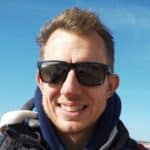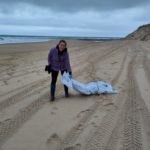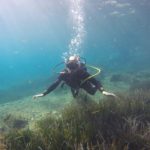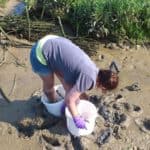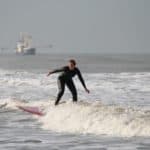Profile
Rebecca von Hellfeld
-
About Me:
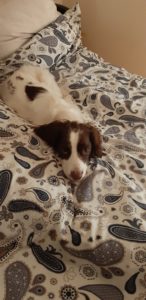 Hi, my name is Rebecca! I am a marine biologist and am super passionate about saving the ocean! 🐳 I live in Aberdeen, Scotland, with my dog Scoby (a wild springer spaniel who can make the cutest face to get out of all sorts of trouble! 🐶) and my partner. In my spare time I love being out and about, enjoying the sun (when we get it…), or spending time with friends.
Hi, my name is Rebecca! I am a marine biologist and am super passionate about saving the ocean! 🐳 I live in Aberdeen, Scotland, with my dog Scoby (a wild springer spaniel who can make the cutest face to get out of all sorts of trouble! 🐶) and my partner. In my spare time I love being out and about, enjoying the sun (when we get it…), or spending time with friends.I look forward to reading your questions and maybe one or two of you want to be a marine biologist as well by the end! 🐬
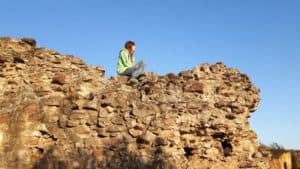
-
Read more
Since moving to Scotland, I have had to accept that its too cold outside to be an outdoorsy person anymore. To keep busy, I have started aerial arts (anything you see in a circus that floats: hooks, silks, ropes, etc.). Although it can be a bit painful at times, it has been really cool to figure out new tricks and skills.
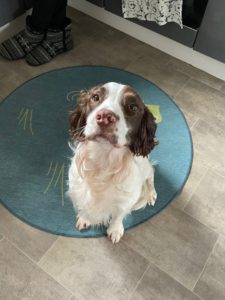
I also love teaching my dog new tricks! Although I am a vegetarian, I have started taking fun gundog training classes with him. He comes from working parents, so I know that he has a strong hunting drive. Taking these classes with him has allowed me to learn more about how he thinks and what goes through his head when we are out and about. It is so cute to see how tired and happy he is after a good training session. I also tell myself that it has made him more relaxed in general, because he is now allowed to do all the things he was bred for (chasing after dummies I throw, bringing them back to me, and crashing through the forest!). Don’t worry no real hunting is going on here!
-
My pronouns are:
she/her
-
My Work:
I am a marine biologist and I look at how chemicals are released into the environment, travel into the oceans, and get into animals. I want to understand what the chemicals do to marine animals. Right now I look at their concentrations in marine mammals, because they represent the entire ecosystem they live in.
-
Read more
As a marine biologist, you can focus on many different topics. Some discover new species, others look at how waves form, and again others look at how much fish we can catch before we have a bad impact on the population…
I do none of that! I look at all the chemicals and substances we humans put into the water and how that affects the life of different animals. This allows me to understand what kind of substances (and how much of them) animals are surrounded by, and to look at how much the take up into their body over time. My work right now focuses on heavy metals like mercury, as it comes from so many sources and can have strong effects on brain development and behaviour.
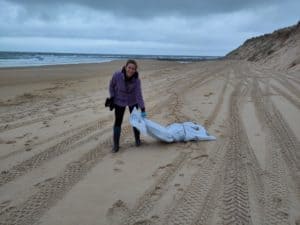 The Scottish Marine Animal Strand Scheme (SMASS) jumps to action when someone reports a dead marine mammal on the beach in Scotland (or the Cetacean Strandings Investigation Programme (CSIP) in the rest of the UK). I am one of the volunteers that then go out to actually collect the body and bring it back with me to hand over the the SMASS team. They then do an autopsy (taking a peak into the inside of the animals to understand why it died) and also take samples for scientists like me!
The Scottish Marine Animal Strand Scheme (SMASS) jumps to action when someone reports a dead marine mammal on the beach in Scotland (or the Cetacean Strandings Investigation Programme (CSIP) in the rest of the UK). I am one of the volunteers that then go out to actually collect the body and bring it back with me to hand over the the SMASS team. They then do an autopsy (taking a peak into the inside of the animals to understand why it died) and also take samples for scientists like me!This allows me to understand whether marine mammals are at risk of being poisoned by these substances, and means that we can then suggest new policies or pay more attention to keeping a closer eye on the animals!
If you come across a stranded animal that is still alive, please do not touch it or try to help it in any way. The animal might be scared and could try and defend itself, and even if it does not, they can carry many bacteria and diseases that don’t harm them but can be dangerous for us humans. Instead, please contact (or ask an adult to contact) one of the following organisations:
The RSPCA (0300 1234999) or the British Diver Marine Life Rescue (01825 765546) if you are in England or Wales, and the SSPCA (0131 3390111) if you are in Scotland.
-
My Typical Day:
While my partner walks the dog🐾, I get ready for the day and prepare breakfast (home-baked bread and a nice espresso with a dash of oat milk ☕). I get to work for 9 am, where I have loads of different tasks. I have lunch with my colleagues 🍝, and in the afternoon it’s back to work. I usually leave around 5 pm, although it is up to me how long I work. Then I head home to take out the dog 🐶, before doing sports 🤸, meeting friends 🎉, or enjoying a quiet night in 🍵.
-
Read more
Since its up to me, what I work on, I get to plan my own day! For example, I might be marking work by students in the morning, then have a meeting about a new project after lunch, and end my day with a bit of lab work! So what do I usually do? Here are some examples:
👩🔬 Lab work to analyse marine mammal chemical concentrations;
💻 Modelling how chemicals behave in different marine food webs;
📄 Writing reports and articles about my results and what that means for society;
📚 Giving lectures or supervising students learning new lab skills;
📄 Writing applications to get more money for my research;
🎤 Answering questions by students who want to know what being a scientist is like.
-
What I'd do with the prize money:
How about an awesome conservation comic!?
-
Education:
🎒 Bonn International School (BIS), Germany: I went to various German schools in my time, but graduated from BIS in 2011.
📚 Queen Mary University of London, UK: I always wanted to live in the UK, so I started my studies in London in 2011 and graduated in 2014.
🎓 University of the Basque Country, Spain: After the UK I wanted to see more of the world (or Europe in this case), so I started my MSc as part of an Erasmus Mundus course. That means that although you have one “host university” (in my case that was the University of the Basque Country), you go to a different “partner university” every 6 months, over the course of two years. So besides studying in Spain, I got to study in Belgium and France, before going back to Spain to do my thesis project. I graduated in 2016.
👩🏻🎓 University of Heidelberg, Germany: After a year of doing odd jobs, I decided to do a PhD in aquatic toxicology (which means I played detective for chemicals in the environment). I spent three years doing loads of different bits of lab work and finished just after the pandemic led to the university shutting down for a few months.
-
Qualifications:
📚 International Baccalaureate (IB), Bonn International School, Germany
📚 BSc Environmental Science and Business Management, Queen Mary University of London, UK
📚 Erasmus Mundus MSc Marine Environment and Resources, University of the Basque Country, Spain
📚 PhD Aquatic Ecotoxicology, University of Heidelberg, Germany
-
Work History:
This is my first job since finishing my studies (if you consider a PhD studying, rather than working).
-
Current Job:
Researcher at the University of Aberdeen.
-
Employer:
University of Aberdeen, UK.
-
My Interview
-
How would you describe yourself in 3 words?
Sea-going detective
What did you want to be after you left school?
Dog trainer, circus artist, actress, marine biologist, professional scuba diver, turtle conservationist, and landscape gardener.
Were you ever in trouble at school?
Of course. I kept forgetting things (never on purpose), and teachers often got frustrated with me for that.
If you weren't doing this job, what would you choose instead?
I'd love to be a librarian or work in a natural history museum taking care of all the artifacts.
Who is your favourite singer or band?
Anything by Deaf Havana or Bring me the Horizon, but I'll listen to almost anything...
What's your favourite food?
A really nice chocolate chip banana bread. Alternatively I'll take a good pizza any day!
If you had 3 wishes for yourself what would they be? - be honest!
1. That my dog was more well behaved, 2. More pets! 3. Having a food forest
Tell us a joke.
Q: What’s the difference between a marine biologist and a dog? A:One tags a whale, the other wags a tail.
-

